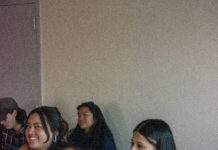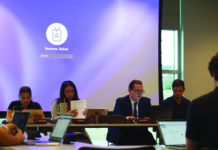The Associated Student Government hosted their presidential, vice-presidential and trustee debates on April 9. The debates are the final campaign event before the elections, held April 11-13.
If you missed the live stream but don’t want to miss the highlights and information of the 2018 debates, read the 10 best and worst moments from this year’s event:
BEST: Utu won’t forget the true mavericks
Candidate for student trustee Pua Utu wanted to advocate for all Colorado Mesa University students, even those who aren’t involved in clubs and organizations. He stated that he will reach out to students who are so involved in their studies that they don’t have the time or opportunity to have their voices heard.
“Often, we forget about those Mavericks who are creating their own paths,” Utu said, in reference to these students whose hobbies and activities are not tied to the university.
WORST: Early technical difficulties
Despite microphone checks, an early technical difficulty with Hobbs’ microphone kept audience members from hearing the entirely of her response to the first question and her rebuttal to student trustee candidate Pua Utu. The same difficulty prevented the audience from hearing the beginning of vice presidential candidate Donovan Harwell’s response as well.
BEST: Hobbs wants to be a part of “big changes” on campus
In addition to advocating for her constituents, candidate for student trustee Amara Hobbs wants to take her opportunity to speak with the Board of Trustees as an opportunity to also be involved in significant changes at CMU. Just as current Trustee Beau Flores was a part of the decision to fund the CMU Teaching Hotel, Hobbs hopes to use the position to be a voice for students during big changes as well.
BEST: Vela brings up transparency (the first time)
Mentioned for the first time as one of the Flores-Vela campaign’s three main goals, Vela explained that transparency for their potential administration meant being open and clear about their actions and spending with both students and the media. During a biennial year such as the upcoming one, Vela said they would publish organizations’ budget requests online, so that students would know how much is being asked of ASG.
Flores later echoed this idea, saying that this transparency would help students “understand they can easily say something.”
BEST: Harwell reminds students to celebrate what’s already good about CMU
When asked about his campaign focus, Harwell stated a goal of their campaign is to celebrate what students already like about CMU. Through their chain link survey, which both Harwell and Troester mentioned, their campaign discovered what students already love: the campus and weather.
WORST: Pass the constitution because people worked hard on it
During his first time encouraging students to vote, Vela asked students to make sure they vote for the constitution, as well as the candidates. His reason: because “long nights” and hard work went into changing it.
Though he corrected this idea during his second time mentioning the constitution—now stating that students should vote for it because it would increase ASG’s efficiency—the first reason was not a policy-related reason to vote in favor, but an emotional one.
BEST: Troester reminds students of resources already available
In their chain link survey, Troester said that many of students’ concerns were regarding campus safety, mental health resources and sexual assault prevention. Instead of criticizing CMU, Troester reminded students that the university has programs in place to help with many of these. She stated that although improvements could and should be made to these, CMU has already taken the first steps in helping students with these issues.
WORST: Transparency, transparency, transparency
Vela mentioned it the first time in reference to being open and honest with media organizations. Harwell echoed this concern in his rebuttal. In the next question, Vela referenced it again, now in regard to the ASG website and changes he and Flores wish to make.
During the presidential section, Troester tied empowering students to become involved and students’ lack of knowledge regarding what resources campus already offers them to a lack of transparency.
All were valid concerns, but by the end of the night, the word was mentioned in nearly every response.
BEST: Flores wants to build an ASG for everyone
While one of the Flores-Vela campaign’s goal is continuing to connect with clubs and organizations, Flores said he wants to build an ASG not just around them, but also centered around academic departments. A goal Vela mentioned as well, the potential Flores administration hopes that connecting directly with academic departments will make sure no student is left out.
WORST: Troester’s goal for allocations is “equality”
When asked if her administration would prioritize keeping student fees low or funding organizations well, Troester chose neither option. Instead, she said she would make allocations “fair and equal” and provide the best outcome for the student body.
But, what does equal mean? Actual financial equality (giving each organization the exact same budget) would give organizations like Sustainability Council the same budget as large and heavily funded ones like the Outdoor Program and the Programming Activities Council.
A response that sounded fair, Troester’s answer did not provide insight into how her administration would actually allocate fees, and if she would support an increase in student fees.



